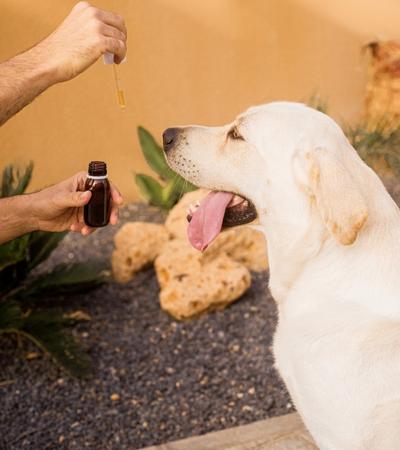Coconut Oil for Dogs With Allergies
The use of coconut oil for dogs with allergies is becoming an increasingly popular treatment. This is due to the association with improving health and wellbeing. Plus, it has become widely available over recent years and may well be a staple ingredient in your pantry.
We know the benefits it has for us, but can it help our fur babies, especially when they’re suffering from allergies?

What Is Coconut Oil?
Coconut oil is created by the compression of mature coconut meat and milk. This creates an edible oil-based solid that’s high in ‘good-for-you’ fats, known as medium-chain triglycerides (MCTs). Hence, this may explain where all the purported health benefits for both humans and dogs originate.
Can Dogs Be Allergic to Coconut Oil?
Dogs can develop allergies in just the same way as humans do. While there are many benefits to adding coconut oil to your dog’s dinner, you must be aware of the symptoms of a coconut allergy in canines.
If your dog has any of the following, you could be dealing with an allergy:
- Stomach upset.
- Vomiting.
- Diarrhea.
- Itching.
If you’ve started adding coconut oil into your dog’s diet and you notice the above symptoms — stop using it and speak to your vet immediately.
Benefits of Coconut Oil for Dogs With Allergies
Although research is limited, the use of coconut oil for dogs allergies is thought to offset any unpleasant symptoms.
The benefits of giving your dog coconut oil include:
- Fight harmful fungi and bacteria — studies suggest coconut oil has positive results when fighting certain fungi and bacteria. The antimicrobial properties help to fight infection. It’s also helpful to deter pests like ticks and fleas.
- Improve digestion — the oils encourage better nutrient absorption in your dog’s gut.
- Ease inflammation — a primary symptom of allergies is itching, which in turn, causes inflammation of the skin. Offering your dog coconut oil can help reduce this immune system response, as well as alleviate swelling and itching.
- Boost skin and coat condition — research has shown that coconut oil can make hair and fur shinier and strengthen the follicles. Lauric acid (a fatty acid found in coconut oil) can penetrate the roots and make the fur look better and healthier.
While coconut oil shows promise for dogs with allergies, bear in mind, that before offering it to your pet, you must ensure:
- They aren’t allergic to coconut.
- You understand how much your dog can have in relation to their weight.
- To look out for any allergy symptoms.
- You consult your vet for advice.

How Can I Give Dog Allergy Coconut Oil?
Many dog owners add coconut oil to their furry friends’ food. It’s safe for them to consume in this way, but it can also be massaged into their fur and skin.
Even though it seems to have many benefits, start with a little and then build on that amount. Plus, the dosage they can have will differ depending on doggy weight. This is a sure way for you to monitor how it affects your dog and their health.
Coconut oil-based treats are also becoming popular. Offering your pooch a tasty no-bake treat can take the pressure off if they aren’t too keen on it in their food.
Is Coconut Oil for Dog Allergies Safe?
As with anything we feed or use on our dogs, there are points to be aware of when giving coconut oil orally.
Potential for Allergic Reaction
Specifically speaking, if your furry friend is showing signs of a dog allergy to coconut oil, you need to stop immediately and monitor their symptoms. If they worsen or if you’re not sure what has caused the reaction, contact your vet.
Obesity
Giving your pooch coconut oil can increase the chances of weight gain — particularly in dogs that aren’t very active. After all, it’s an oil, which in turn, is fat. Regardless of whether it’s a ‘good’ fat, too much fat in your dog’s diet can make them ill and may contribute to high cholesterol.
You’ll need to work out the additional calories your dog is consuming through the coconut oil and offset that against the amount of food they are consuming. Feeding them coconut oil will only add to the weight gain if not given responsibly.
Fat Content
Another consideration is that coconut oil will not meet your dog’s daily requirement of omega 3 and omega 6. This means you will have to ensure their food contains sufficient levels. Alternatively, you can give them a boost by offering a supplement, like fish or salmon oil for dogs.

Conclusion
The benefits of using coconut oil appear promising for pooches. If you add coconut oil into your dog’s diet, you may be pleasantly surprised how well it works for your woof woof.
Although it’s worth bearing in mind, there are some drawbacks — doggy’s watching their weight being one example, so it may not be suitable for every canine.
That said, on the whole, coconut oil for dogs with allergies is safe to take. So, providing you don’t overdo it, the benefits far outweigh the risks.
Coconut for Dogs With Allergies FAQs
Can I Put Coconut Oil on My Dog’s Paws?
Cracked paws can be very painful for your pup. Adding coconut oil acts as a moisturizer. Don’t be concerned if your dog licks it off, it’s safe for them to eat.
Can I Leave Coconut Oil on My Dog Overnight?
It isn’t recommended to leave coconut oil on your dog’s fur overnight, because despite the benefits, it can clog up your dog’s pores and prevent the natural oils from being released.
Will Coconut Oil Keep Fleas off Dogs?
It’s a misconception that coconut oil can kill fleas. However, the lauric acid contained within acts as a great repellent.
Can Coconut Oil Cause Allergies in Dogs?
Some dogs can be allergic to coconut oil in the same way that humans can. The side effects to look out for are:
- Vomiting.
- Itching.
- Upset stomach.
How Much Coconut Oil Should I Give My Dog for Allergies?
It’s suggested that you can give dogs coconut oil once or twice a day. And, you should start with ¼ teaspoon daily for smaller dogs and increase to 1 teaspoon to 1 tablespoon for larger dogs.


